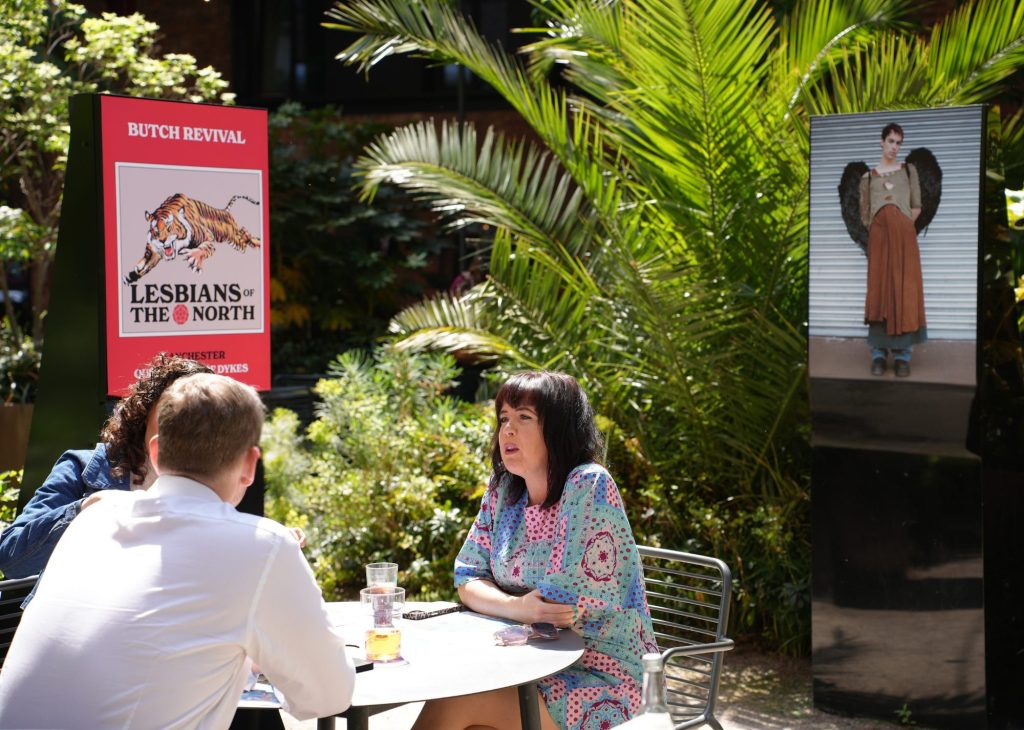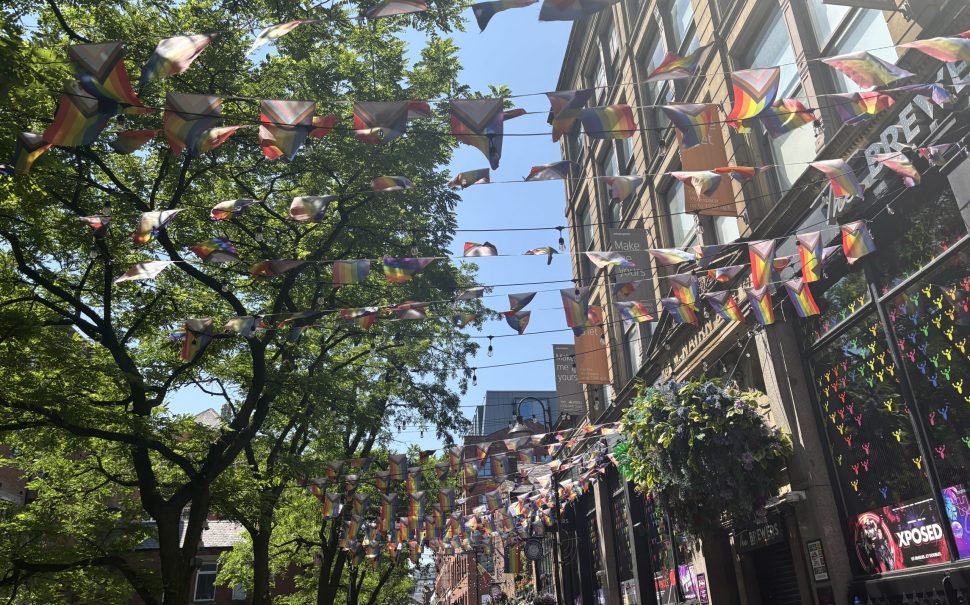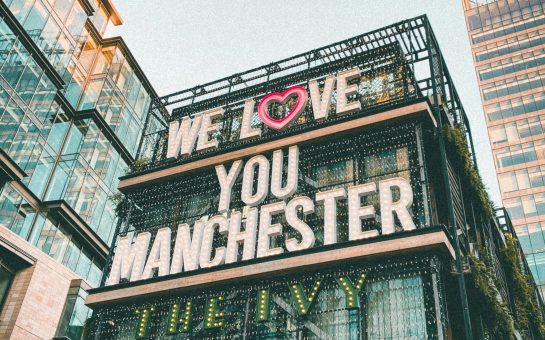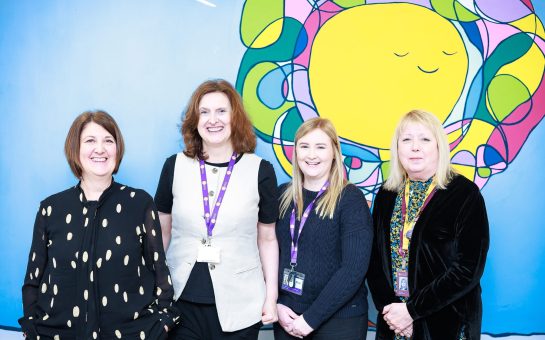On 2 January 1975, six members of the Manchester Gay Alliance 1973, set up a helpline. Through pamphlets handed out at gay-friendly hubs, they discreetly advertised a phone number offering free, confidential support. On a stairway windowsill in a modest flat in Longsight, South Manchester rang the phone of the Manchester Gay and Lesbian Switchboard Services (MGLSS). And there, the LGBT Foundation was born.
The foundation has existed through a rollercoaster of progressive and homophobic legislation and zeitgeists. While homosexuality was partially decriminalised in 1967, a few years before MGLSS was founded, the many anti-gay laws still in place were policed more aggressively. The foundation’s health and wellbeing ethos grew through the HIV/Aids crisis and Thatcher’s Section 28 Amendment of the Location Government Act prohibiting the promotion of homosexuality.
And 50 years on from its founding, we are still on that rollercoaster. The rise of the far-right has fuelled anti-LGBTQ+ sentiment, actively stopping progression and reversing laws. The Supreme Court’s ruling on the legal definition of a woman in April sparked UK-wide transphobia, with local authorities and businesses immediately implementing anti-trans policies.
Organisations like the LGBT Foundation remain integral for the continued fight for LGBTQ+ rights, and celebrating a 50 year milestone is not just impressive, it’s vital – for visibility, for representation, and to spread the 50th Anniversary’s theme, queer hope and joy.
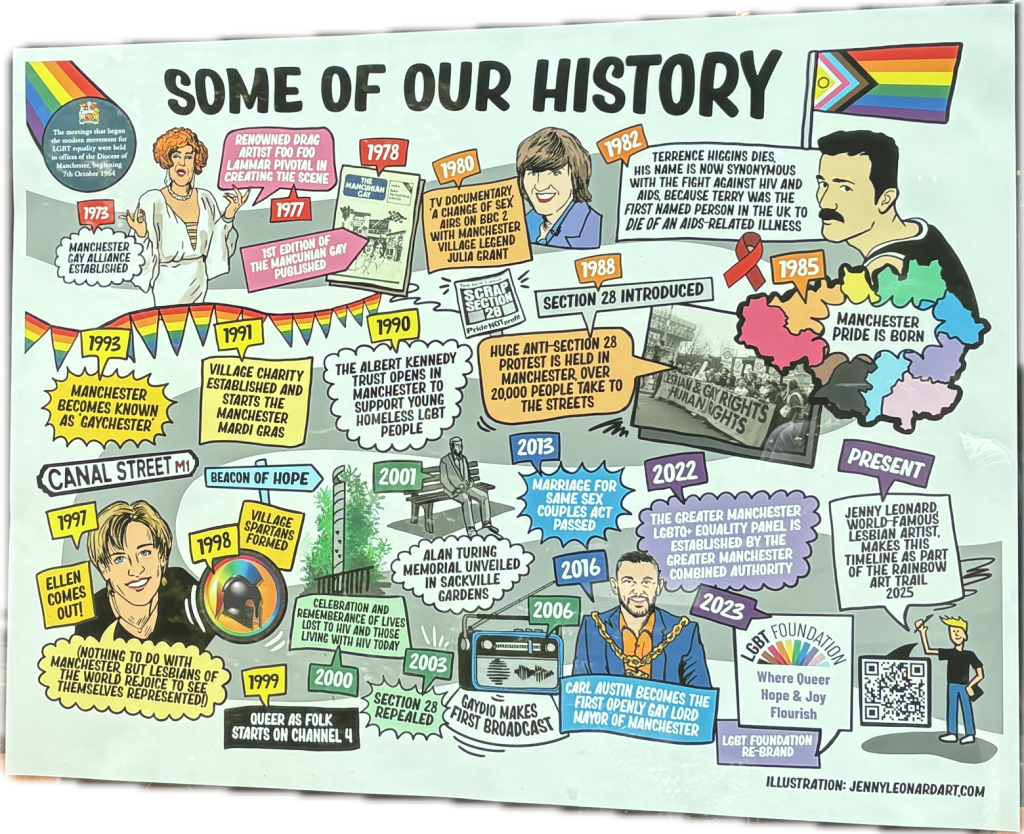
A timeline of significant events in local and national LGBTQ+ history for the Rainbow Arts Trail (photo by Sally McLennan)
Reaching the end of Pride Month, the LGBT Foundation is right in the middle of its year of 50th Anniversary celebrations, having already hosted an array of events, talks and campaigns reflecting the organisation’s history, ethos and services. Today, the foundation will launch 50 Years of Queer Hope & Joy at the Manchester Central Library, an exhibition showcasing the incredible archive researched and collated by archive volunteers. They have processed and catalogued over 25 metres of material so far.
Stevie Watson (she/her), Project Manager for the 50th Anniversary, highlighted the importance of having these archives: “I think the archives project is really close to my heart. A lot of the materials that we’ve produced over the last 50 years weren’t designed to survive.
“We’ve got a collection of beer mats and they advertised stuff like going to get a sexual health screening, our safer sex packs, and our pride and practice programme. They were distributed in village venues and were just a way of trying to reach the community and spaces where they were already gathering. But they were made out of recycled paper and not designed to survive.
“But they speak to some of the really innovative ways the foundation has done its work to connect to the community. What we already have in the archives and our desire to grow them, is about trying to protect materials that otherwise would have disappeared and the stories with them.”
These beer mats will be displayed alongside other cultural treasures that showcase the diverse ways the foundation has connected with the community during its lifespan. Other materials include old copies of Outnorthwest, a local publication that has also been relaunched this month. Copies of bills co-signed by the foundation for the Equal Marriage Bill. Campaign support letters by famous names like Sir Ian McKellen. To name but a few.
The volunteers have also been working to record, maintain and make accessible oral histories relating to the North West’s LGBTQ+ communities, past and present. Crucial for preserving personal experiences, diverse perspectives and memories from the LGBTQ+ community. Already accessible via soundcloud and the library, they have also been woven into the exhibition.
Alongside the exhibition launch will be the official launch of the Rainbow Arts Trail. Running since May until September, the interactive trail spans from Manchester Piccadilly, to Kampus, the iconic Gay Village and beyond. On display are photos, illustrations, sound installations and other creative works. The carefully curated route aims to celebrate the power of LGBTQ+ voices and highlight the positive impact of queer hope and joy.
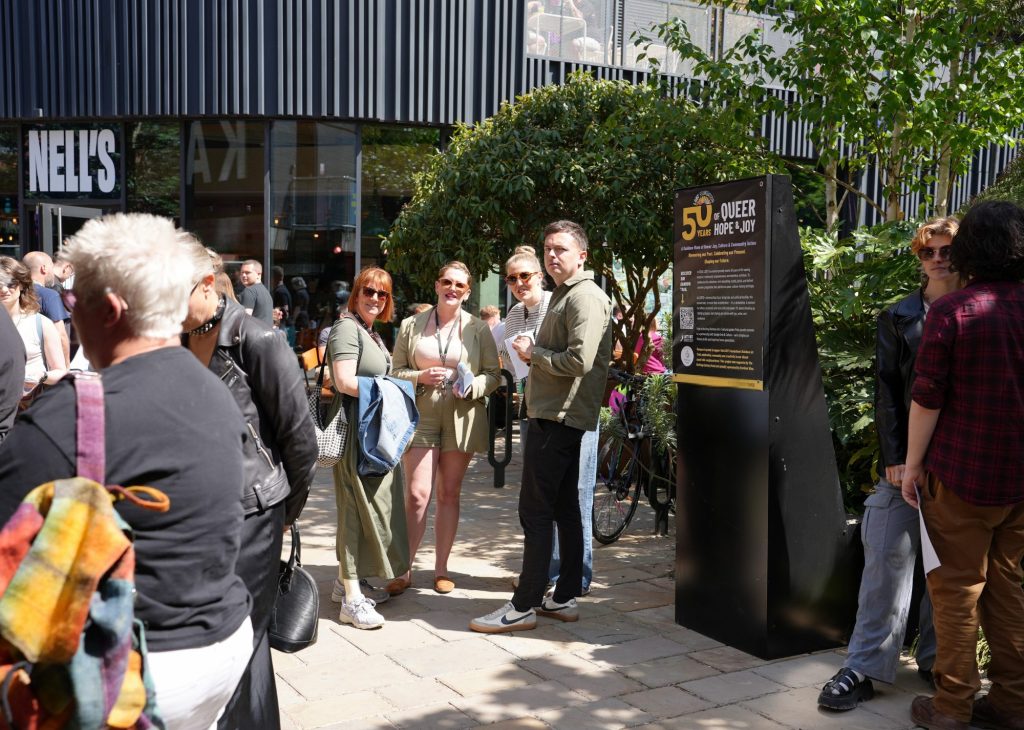
Matthew Belfied (he/him), Head of Communications spoke about how the Rainbow Arts Trail idea came together: “We envisioned it as a way of bringing in community voices and lived experiences to the front. We wanted to offer up the city as a canvas for people to express creatively what queer hope and joy means to them in an artistic manner.” The trail was project managed by Debra Nixon, Deputy Director of Self-Generated Income, whose vision, dedication, and leadership were instrumental in bringing this project to life.
In total 25 artists across the UK have produced artwork for the trail. A trans artist has made sculptures celebrating trans bodies, non-LGBTQ artists have created art in show of solidarity, LGBTQ health professionals have made work closely related to their work and campaigning to raise awareness and educate, the variety is great and the foundation hopes their reach will be too.
Matthew said: “We want people to see this artwork who won’t know a thing about the LGBT Foundation. As they do this trail, we want people to use it as an opportunity to think about how they support LGBTQ+ people and look at ways of channelling activism. We believe there are a lot of people out there who want to support the LGBTQ+ person in their lives or want to support an organisation, but don’t know how. So we want the art of the Rainbow Arts Trail to be a standpoint for a conversation.”
The LGBT Foundation has worked hard to consistently lift up different standpoints and experiences within the community. One of the earlier campaigns of the 50th Anniversary came eerily well-timed in tandem with the controversial Supreme Court ruling on the definition of a woman. A continuation from the LGBT Foundation’s What Is A Woman campaign in 2023 during Lesbian Visibility Week, This Is What A Woman Looks Like showcased the many different forms of a contemporary woman both within the LGBTQ+ community and with allies of the community.
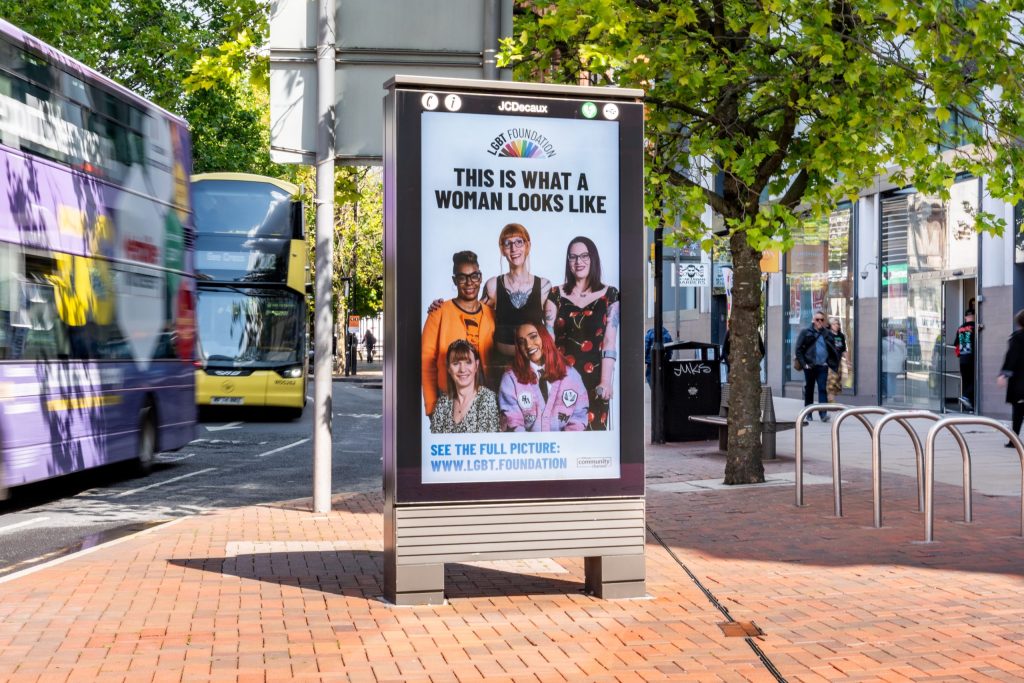
On billboards across UK cities stood a proud declaration of women side-by-side from all walks of life. Lesbian and bisexual women, trans women, women of colour, disabled women, women old and young, working-class women, migrant women, women that weren’t normally given platforms. Through an open call, 30 participants from across the UK came together in a room for a photoshoot all about celebrating women. The simplicity of this action next to the impact of its message resonated with Managing Director Laura Wilkinson, who, with the LGBT Foundation team, helped spearhead this campaign.
Laura joined the foundation in 2022 at a pivotal era. Off the back of COVID and Black Lives Matter, she assessed whether the foundation was reflective of what the communities’ needs were at this time, and through campaigns like What A Woman Is Like, has helped rebrand the organisation to become a broader, more inclusive organisation.
Visibility, representation and solidarity was paramount to the campaign’s message, and was part of a wider pledge to protect and uplift trans and non-binary people, something that feels more vital than ever in the current political climate. Laura told Mancunian Matters: “There is still a void of that visibility in representation and diversity. There is a small minority that are trying to separate people, and we’re stronger because we’re coming together and we’ve all got more in common.”
Laura was at school under Section 28, legislation brought in under the Thatcher government in 1988 prohibiting local authorities from “promoting homosexuality”. This fostered a hostile environment for young LGBTQ people, and meant teachers were not forthcoming in being supportive, particularly if you grew up in a small northern village with no queer representation, like Laura.
“I didn’t know anyone else that was gay, I definitely didn’t know any lesbians, and the lesbians that were on screen were archetypes that I didn’t relate to. If I’d have sneaked on the bus like I used to do to come to Manchester in my late teens and seen that campaign, felt that representation, I know it would have absolutely made my year. It feels like a full circle moment being able to create these kinds of billboards for people that might not see themselves represented because I know how powerful that is from my own experience.”
Like many LGBTQ+ experiences, Laura felt very isolated when she was coming out as a teenager. So her mum rang the MGLSS helpline. Laura found she wasn’t alone, and speaking to the helpline made her hopeful and optimistic. A real full circle moment for the LGBT Foundation and its MD.
Through the rest of the year, the foundation will continue to celebrate queer hope and joy. There will be more regular events like its Pride in Ageing meetups, and the yearly Sapphic Showcase: A Pride Celebration of LGBTQ+ Women’s Talent. And special one-off events, like a community playlist event which coincides with Freshers to celebrate LGBTQ+ and the importance of music in the queer journey. There will also be more exciting announcements over the next few months.
The foundation’s long list of campaigns, events, exhibitions and talks highlights their commitment to the cause. Day-to-day, they run a wide range of services including talking therapies, sexual health support, and domestic abuse and sexual violence support, training academies and its Pride in Practice programme, aimed at improving the experiences of LGBTQ+ people accessing primary care services.
Alongside the archival research is policy work, campaigning and community events. Behind-the-scenes, the team is balancing their 50th Anniversary duties with their day-to-day work. Pride in Practice and training academies still run, talking therapies are still available, campaign work for legislative change is still busy. There are also now over 200 volunteers supporting the organisation.
And, of course, the helpline is still open.
If you have read anything that has resonated with you and you’d like to learn more, visit the LGBT Foundation website here: https://lgbt.foundation/
Or call the helpline, open Monday to Friday 9:00 – 18:00, here: 0345 3 30 30 30
For more information on the organisation’s 50th Anniversary: https://lgbt.foundation/50years/
